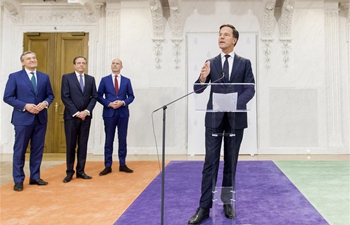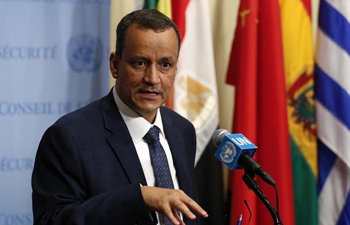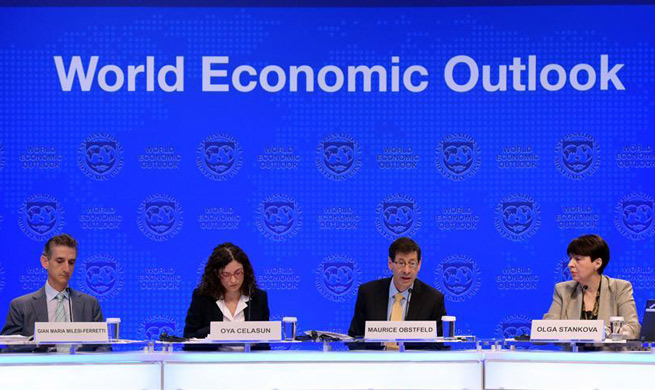by Xinhua writers Yuan Quan, Gao Bei
BEIJING, Oct. 11 (Xinhua) -- "I do."
These two words brought Liu Yuan, 38, a father of two boys, to the verge of tears. But it wasn't a wedding vow. The answer came from the relative of an organ donor.
In China, every after-death organ donation must get permission of family members. Since 2013, Liu has been a coordinator of organ donation at Beijing Youan Hospital, dealing with family approaches, organ donation and procurement, as well as funeral services.
From November of 2017, along with 21 other medical specialists from Shanghai, Beijing, Guangzhou, Kunming, Wuhan and Nanchang, he will train postgraduate students in organ donation and transplants.
Liu and his colleagues think the course is a key step for China to adopt a more professional approach to organ donation in line with international practice.
SKILLS SHORTAGE
Liu, a liver transplant surgeon, had never been trained in organ donation before 2013.
He was reluctant to take the job at first and mistakenly thought the work of a coordinator was nothing more than "persuading people to donate". One of his colleagues quit without any donations over six months.
He bought books and took courses on sociability, in hope of better communicating with the families of patients.
The first organ donation he completed was over a drink. A 13-year-old girl with a brain tumor was declared brain dead, kept alive only by machine. But her family was reluctant to agree to donations.
Liu invited her father for a drink, and the two men formed a bond. Liu recalls how they cried all night, not only for the sufferings of the family, but also for a father's regrets.
His companionship and understanding worked. The next day, the father agreed to donate his daughter's liver, kidneys and corneas, helping at least three people.
In the past four years, Liu has completed more than 30 organ donations. But the failures "would be more than five times that number".
Liu thought the main impediment to donation was that many conservative elderly folks still firmly believed in the Chinese tradition of burying the dead intact. Liu says even his parents did not support organ donation.
He was abused and suspected of being involved in organ trafficking when he asked, "Do you agree to donate the patient's organs?"
China banned the use of organs from executed prisoners in 2015 and made voluntary donation the only legitimate source. With the system more fair and transparent, the number of organ donors is growing and public awareness is rising.
Around 10,000 people have donated 28,000 vital organs after death to date. A total of 4,080 people donated their organs in 2016, while in 2010 the number was only 34. Almost 300,000 Chinese have expressed a wish to donate their organs.
The country has also speeded up the training of doctors to overcome a skills shortage.
Liu has seen many intensive care medical staff fail to maintain the organ functions of potential donors, which led to organ failure and affected the quality of donations. This was due to lack of expertise, he believes.
Seven Chinese universities will offer postgraduate courses in organ donation and transplants, under the KeTLOD project (Knowledge Transfer and Leadership in Organ Donation from Europe to China). Co-founded by the European Commission and Chinese universities, it is expecting to enroll 140 postgraduate students from November.
Liver transplant specialist Xue Feng will teach the course at Shanghai Jiaotong University. It will fill a gap in China's medical education, he says.
"We have lagged behind Western countries for nearly three decades. We have to work harder."
SPANISH LESSONS
Liu joined a special online course in February with another 21 Chinese doctors.
They were questioned by organ donation specialists from Spain, Italy and France, who offered expertise and experience in clinical approaches, management and dissemination strategies in organ donation, in accordance with European guidelines.
The three-month on-line course was conducted through a discussion group on a social network app that enabled students to read lecture notes on their smart phones. Surgical operations were presented in pictures and videos; and online translation tool helped communication in English.
The doctors then went to the University of Barcelona in May for a week-long course.
They will soon teach what they have learned to 140 postgraduates over two years in seven universities.
Marti Manyalich, president of Spain's Donation and Transplantation Institute, said at the launch that training is not just about sharing knowledge, but about transferring the course to China, adapted to local needs.
"Seven universities are not enough. We must train more Chinese professionals in the next decades," said Marti.
Spain has the highest organ donation rate in the world. In 2016, it had 43.4 donations per million people, while China had 2.98, although that was up from 0.03 in 2010.
One reason behind Spain's success is pioneering professionalization. Back in the 1980s and 1990s, the University of Barcelona began to offer graduate courses in organ donation, which were recognized and followed by other European countries.
Since then, Spain has taken the lead in establishing international training and exchanges, training more than 10,000 professionals around the world.
China joined the project in 2013. Wang Lu, an organ donation coordinator in Beijing Youan Hospital, is one of the "seed doctors". She was impressed by the extensive open discussions, scenario teaching and the Socratic questioning method, which are rare in Chinese training.
Liu learned that keeping silent during family approaches is better than talking sometimes.
Humility wins trust, says Zhang Lize, a neurologist who took part in the training. "This also applies to other aspects of the work."
BEST PRESCRIPTION
Many internal medicine specialists or grass-roots doctors who still question the benefits of organ transplants are unwilling to help find potential donors among their patients. Some probably lack knowledge, but some prefer to avoid potential tensions with patients.
The organ procurement organizations, teams responsible for the evaluation and procurement of donor organs, are loosely organized or severely marginalized in many hospitals. There are no offices or full-time coordinators.
Chen Xiaosong, coordinator of Shanghai Renji Hospital, worries about finding doctors who want to teach and students interested in studying the subject. Textbooks have not yet translated into Chinese.
Hou Fengzhong, vice director of China Organ Donation Administrative Center, says despite remarkable achievements in the past 10 years, China's organ donations are still in the primary stage, requiring the whole of society to work together.
He advocates closer cooperation in legal, economic, political and medical sectors. He also suggests the Ministry of Education offer supportive policies to encourage more colleges, even middle or primary schools, to have classes on organ donation.
Liver transplant specialist Li Wenlei, head of the course in Capital Medical University, thinks education is "the best prescription" for China's organ donation.
"If organ donation is a river, then medical staff work downstream, dealing with individual cases. But when organ donation becomes a part of education, they move upstream and can influence a whole generation."

















